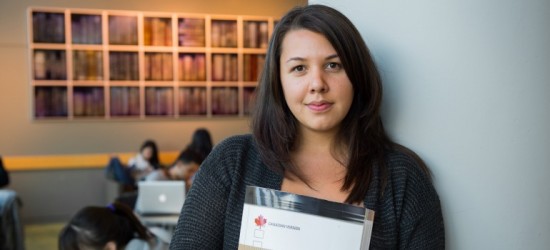
Jessica Boon is one of 17 UBC students receiving a tuition waiver. Photo: Don Erhardt.
A tuition waiver is opening up a whole world of fresh possibilities for current and former youth in care
When Jess Boon first found out that UBC was offering tuition waivers to current and former youth in care, she was filled with emotion. “I remember just sitting in front of my computer crying tears of joy,” recounts the self-assured first-year student in the coordinated arts program. “Because it didn’t just mean something to me, I knew that many of us would come forward and go forward with it.”
Boon, 24, is one of 17 UBC students—11 at the Vancouver campus, and six at the Okanagan campus—receiving the tuition waiver, which was introduced this year. The waiver covers full undergraduate tuition for residents of B.C. currently or formerly living in care in the province.
UBC is part of the first wave of universities responding to last year’s challenge from Children’s Representative Mary Ellen Turpel-Lafond to waive tuition for students like Boon, who transition out of care at age 19. Vancouver Island University was the first to introduce the tuition waiver as a pilot project in 2013; this year, UBC is leading the charge, along with Langara College, the University of Victoria, and BCIT, among others.
“It’s the right thing to do,” says UBC registrar Kate Ross, associate vice-president of enrolment services. “Post-secondary education is an equalizer, so an institution like UBC should be doing everything we can to support members of the population within British Columbia who are bright and motivated, but who don’t have the same advantages as others.”
Applicants for the tuition waiver must have started post-secondary education within five years of being in care, and enroll in their first undergraduate degree at UBC within five years. There are no limits to the number of students UBC will accept under the program, and Ross says she expects it to double next year.
Without the program, Boon says, university would simply not be in the cards for her.
Placed in a Port Coquitlam all-girls foster-care home at the age of 14, she became a full legal guardian of the ministry at age 17. “The experience of care was pretty traumatizing,” she confides. “I was going through stuff with my family, and seeing the experiences of the girls I lived with. When you’re a teenager and already in a tough spot, it doesn’t help.”
School wasn’t easy. Boon switched schools and programs many times—attending five different schools in total. “It still blows me away that I ended up being in university, because if you saw what I was like during my teen years and as a student you would think, ‘No, that’s not happening,’” she remarks.
At age 19, she transitioned out of care and faced an uncertain future. “My circumstances were immensely grim,” she says. “I was struggling with things like finances, I had almost no sense of identity, and I had a very crippling case of post-traumatic stress disorder. I couldn’t imagine myself doing anything at all, because I just was so caught up in the cycle of PTSD.”
It was only after connecting with a support and advocacy group—The Federation of B.C. Youth in Care Networks (the Fed)—that Boon began to leave the past behind. She completed high school and worked contract to contract as a youth worker with the Fed and the Adoptive Families Association of B.C. until the opportunity to attend UBC came along.
She is currently enrolled in courses in political science, sociology, First Nations studies, and academic writing. “I’m definitely having my brain smashed open with information,” she says, with a laugh. “Actually, to me, some of these concepts aren’t that difficult. As a former youth in care, my life was very much entrenched in bureaucracy. So talking about bureaucracy in class, I was like, ‘Yeah, okay, I kind of know all about this.’”
Ross says she’s thrilled at how the tuition waiver program has been received by the youth in care community. “The participation has exceeded our expectations,” she enthuses. “At UBC, we are committed to increasing access for student populations who typically have low participation rates in post-secondary education. We feel a responsibility to provide a world-class education to students like Jess, and create opportunities for all bright, talented individuals to prosper socially and economically in British Columbia.”
Boon’s long-term goal is to major in social work, and help make a difference to the youth in care community and beyond. “I know that after I graduate, for quite some time, I am going to be working with this community,” she says. “The big push for me, for going to university, is that I want to do something great. Before the tuition waiver program, these things didn’t seem possible. It’s definitely opening up a huge opportunity for me and I think it is a symbol of hope for our community. It’s the first time for us to really pursue our dreams.”
This story was originally published by UBC Public Affairs. Reprinted with permission.
Comments are closed, but trackbacks and pingbacks are open.